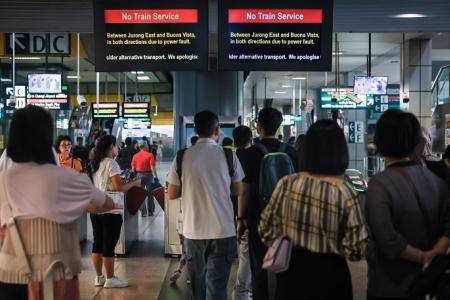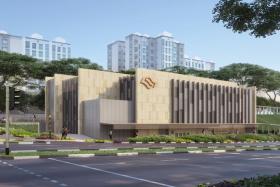MRT reliability and how transport fares are set are separate issues
The reliability of train services should have no bearing on how public transport fares are set, Transport Minister Chee Hong Tat said in Parliament on Oct 15.
There are “other measures in place to ensure service standards are met”, he said in a ministerial statement on the massive disruption that paralysed services on a stretch of the East-West Line for six days.
Between Sept 25 and 30, there was no train service between Jurong East and Buona Vista MRT stations, after a train caused extensive damage to 2.55km of tracks and trackside equipment. About three million passenger trips were affected before rail services resumed on Oct 1.
Workers’ Party MP Gerald Giam (Aljunied GRC) had asked whether the Public Transport Council (PTC) would review its decision to increase public transport fares, on the back of one of the worst disruptions to hit Singapore’s MRT system in its 37-year history.
He also suggested considering service reliability in the period leading up to the date of the proposed fare increase as a factor in the fare adjustment formula.
From Dec 28, public transport fares will go up by 6 per cent, with each train and bus ride costing 10 cents more for adults who pay by card.
Mr Chee said that while the PTC had previously thought about linking fare reviews to disruptions and service levels, it ultimately “decided not to adopt this approach”.
Elaborating on measures in place to uphold service standards, Mr Chee said that when disruptions happen, the Land Transport Authority (LTA) “would establish the cause and accountability, and mete out penalties when necessary”.
Public transport operators that do not meet reliability targets will also miss out on payments under the Government’s incentive schemes, he added.
Mr Chee noted that the annual fare review exercise is meant to “ensure that fares keep pace with changes in operating costs, so that the public transport system remains financially sustainable”.
“If our fares are not adjusted to reflect rising operating costs, the persistent shortfall would have a chronic impact on service quality and reliability over time,” he said.
The Government will provide about $2.25 billion in the coming year to subsidise public transport operations.
On costs arising from the disruption, Mr Chee said rail operator SMRT will foot the entire bill of the recent EWL disruption.
He did not provide a figure, but said it will include the cost of free bridging and regular bus services, foregone revenue for the length of the disruption, extensive repair works and overtime pay for LTA and SMRT staff who worked round the clock to repair the damaged tracks.
Asked about compensation for affected commuters, Mr Chee said those who exited at the stations between Boon Lay and Queenstown were not charged for their journeys.
SimplyGo, which handles for payments for public transport, has been giving refunds to passengers who were charged for two journeys instead of one as they had exceeded the 45-minute limit for transfers.
Commuters can approach SimplyGo if they have any questions about their fares, Mr Chee added.
On the ongoing probe, he said investigations should be completed in the next few months, and that LTA will “mete out penalties” if lapses are found.
Under the Rapid Transit Systems Act, rail operators can be fined a maximum of 10 per cent of its annual fare revenue for an affected rail line.
SMRT’s rail revenue for the 12 months ended March 31 stood at $886.7 million. It operates the EWL, North-South Line, Circle Line and Thomson-East Coast Line.
The operator was fined a record $5.4 million for a massive breakdown on July 7, 2015 that crippled both the North-South and East-West lines for more than two hours and affected more than 250,000 commuters.
In July 2018, LTA fined SMRT $1.5 million for a flooding incident in the tunnels between Bishan and Braddell MRT stations in October 2017. The disruption brought train services between Ang Mo Kio and Newton MRT stations to a standstill for 14½ hours, affecting about 231,000 commuters.
SMRT was also fined $2 million for two major disruptions on the North-South Line in December 2011 that affected about 221,000 commuters in total.
Get The New Paper on your phone with the free TNP app. Download from the Apple App Store or Google Play Store now


